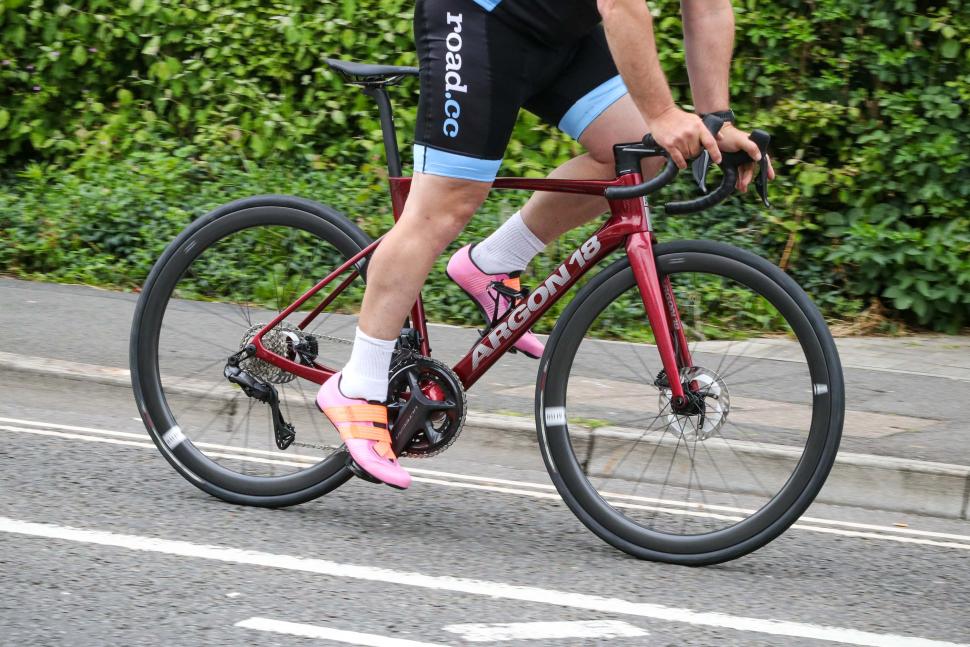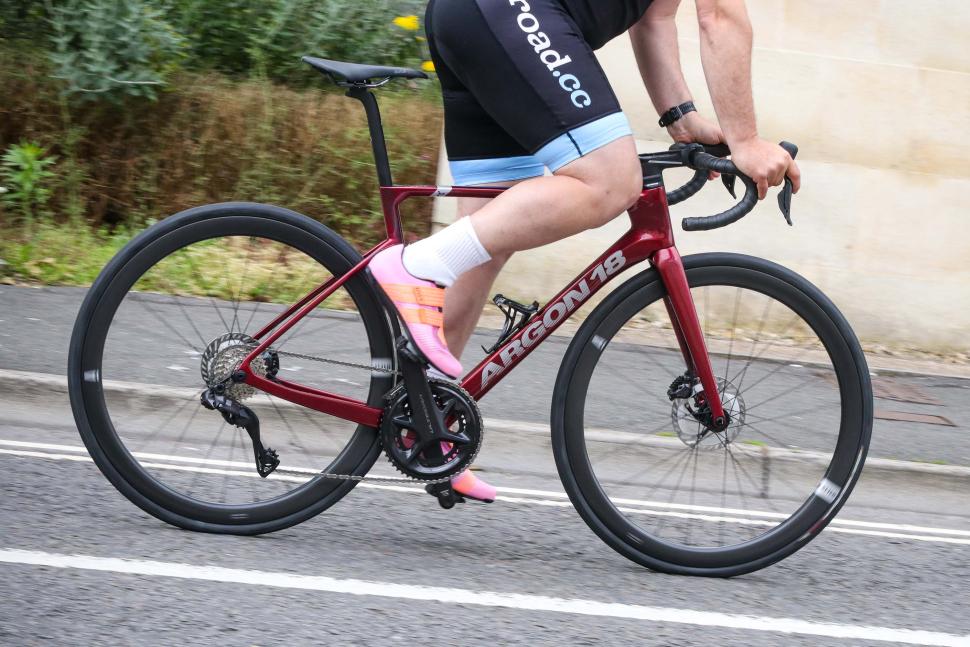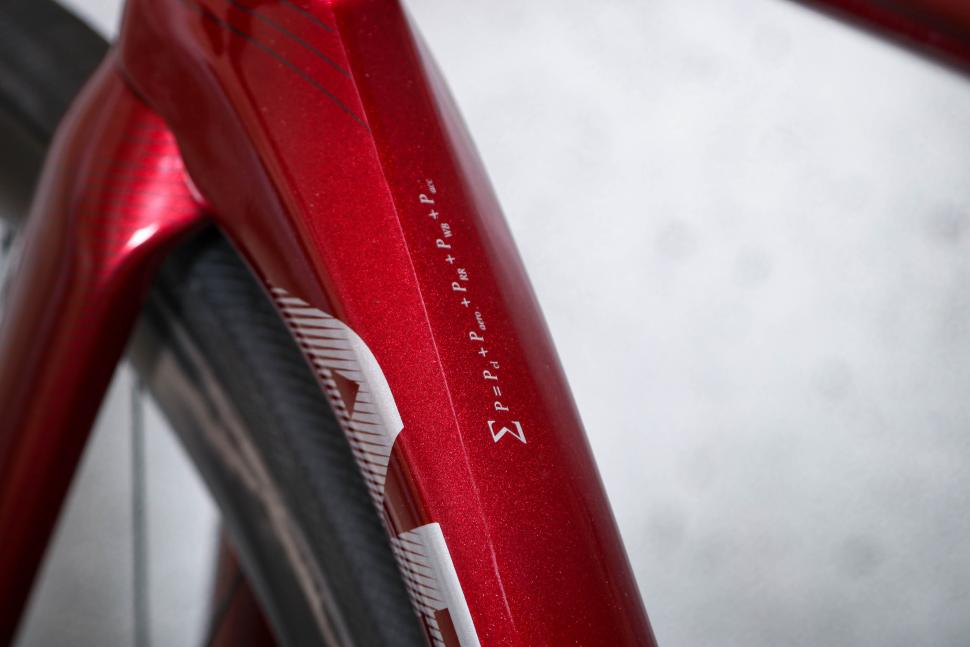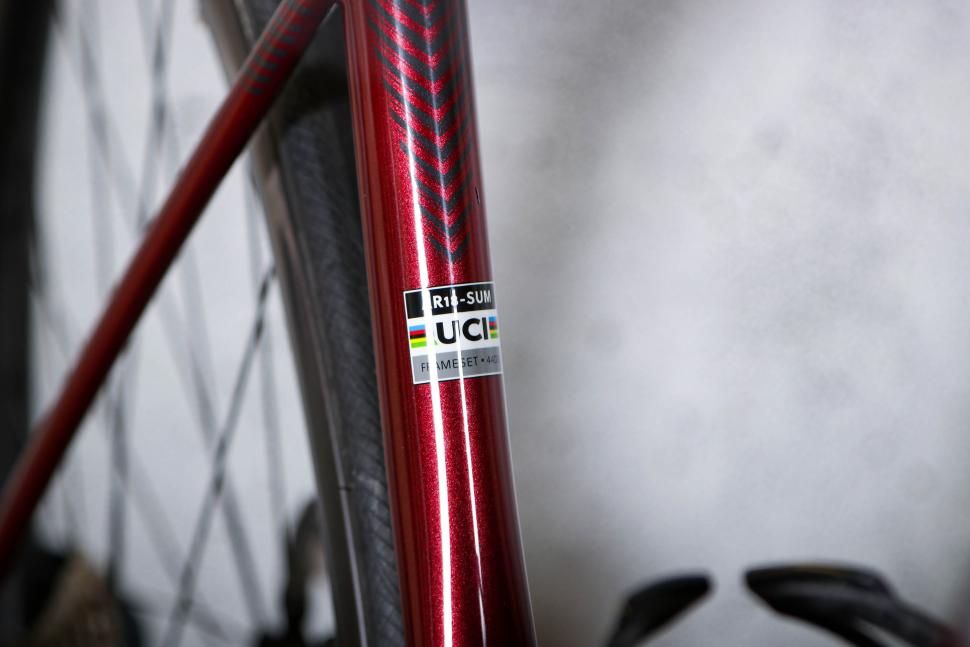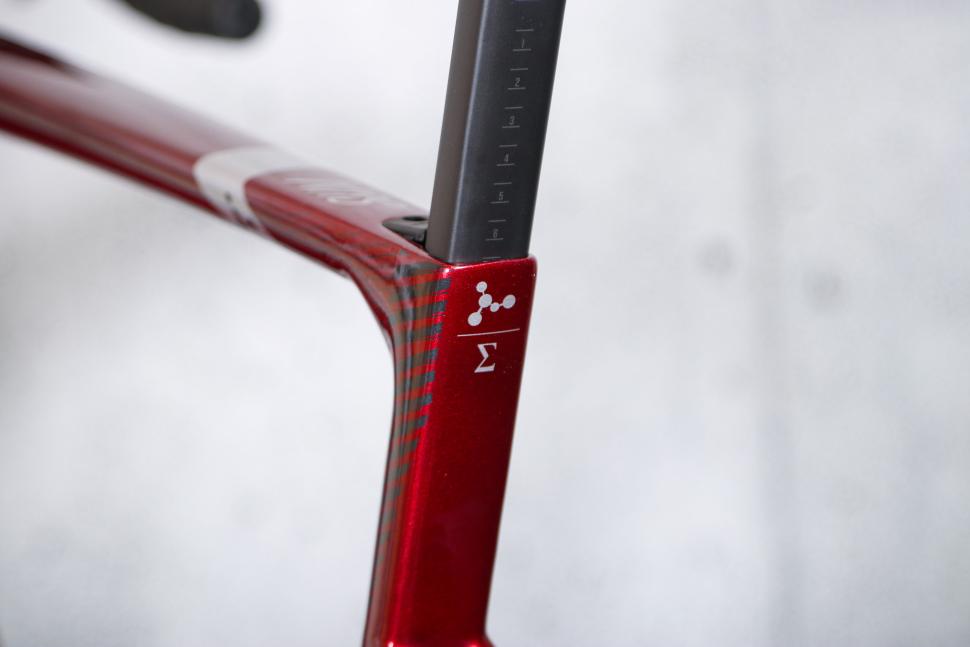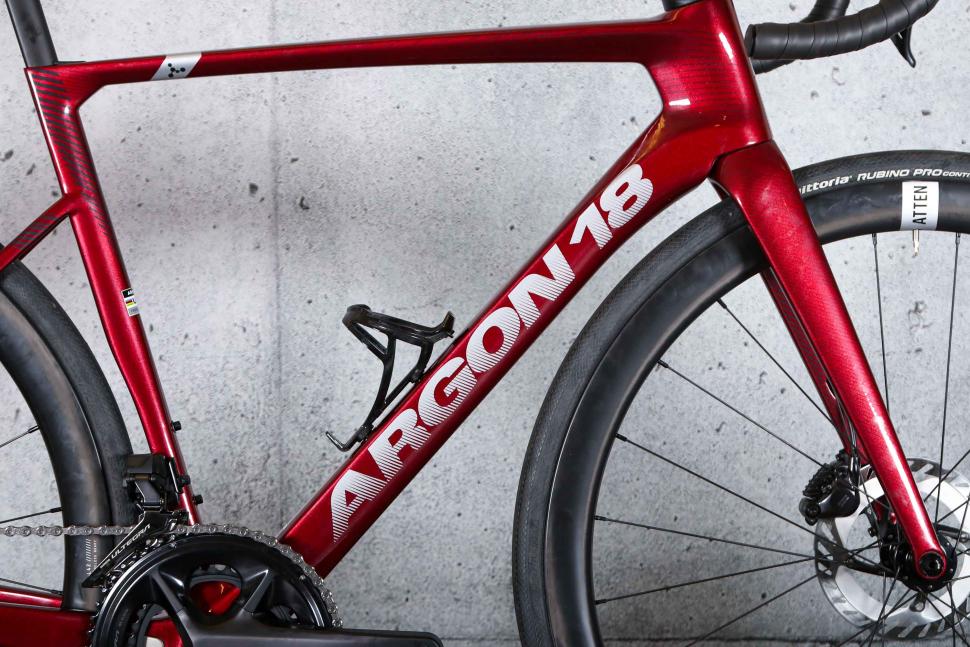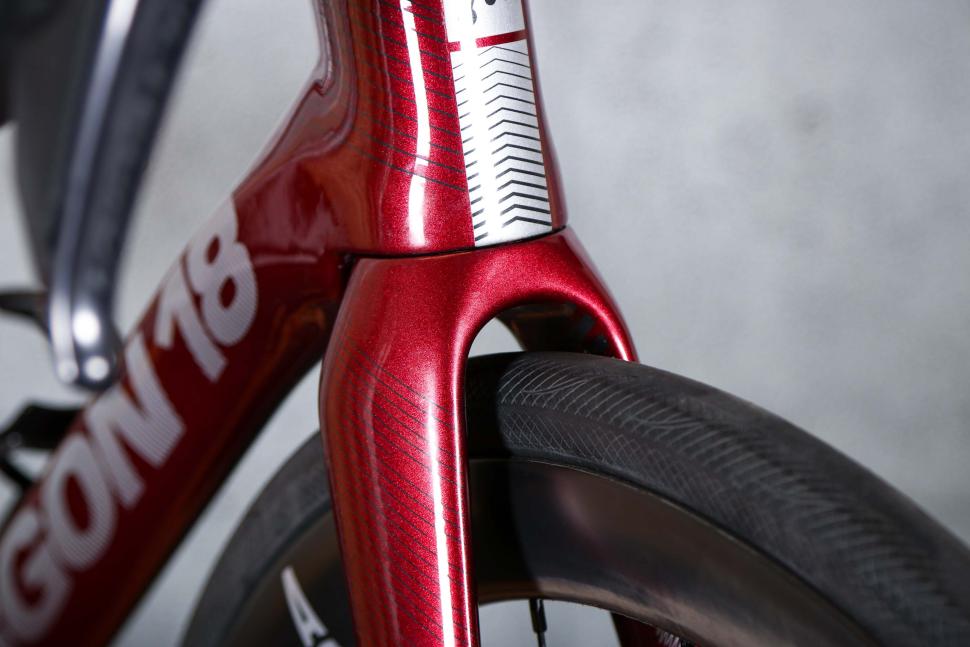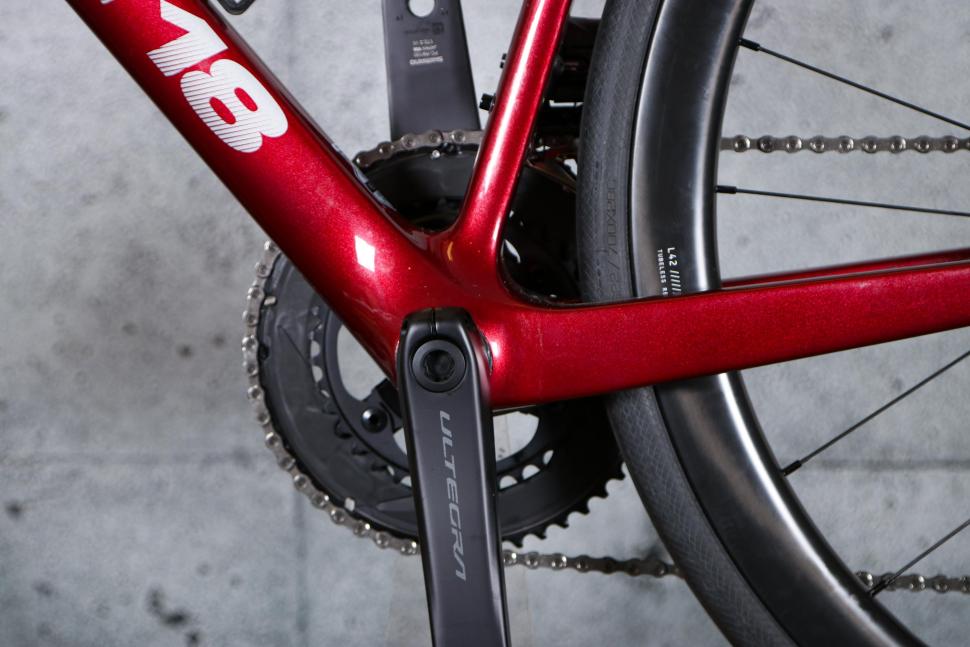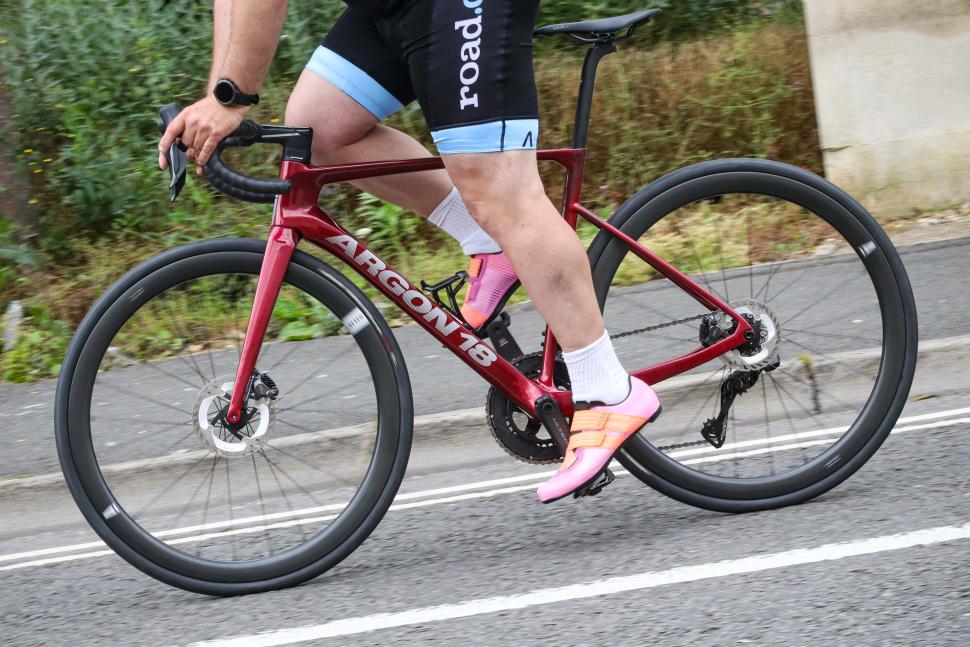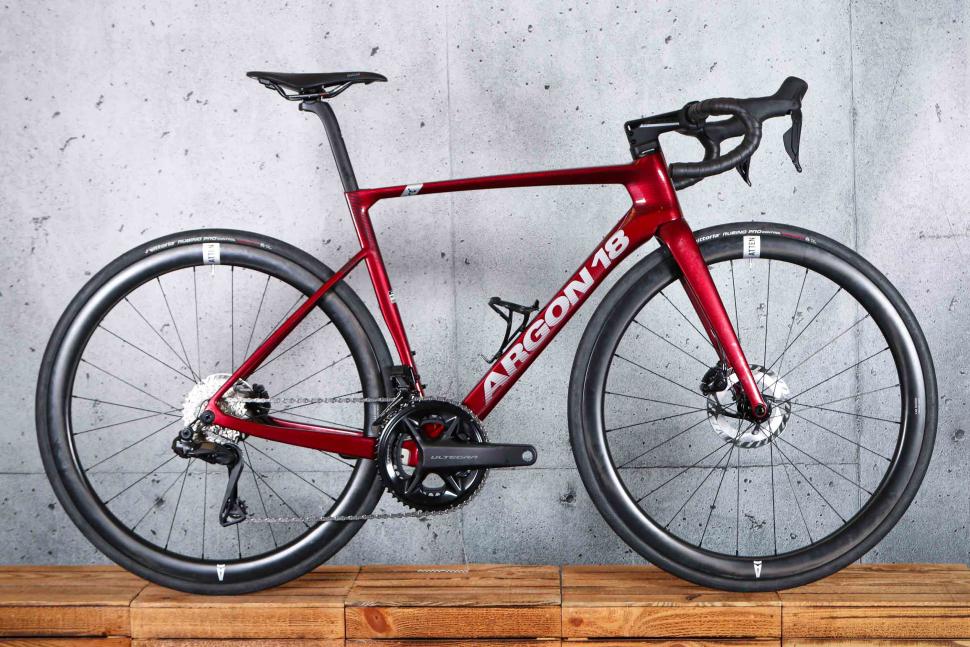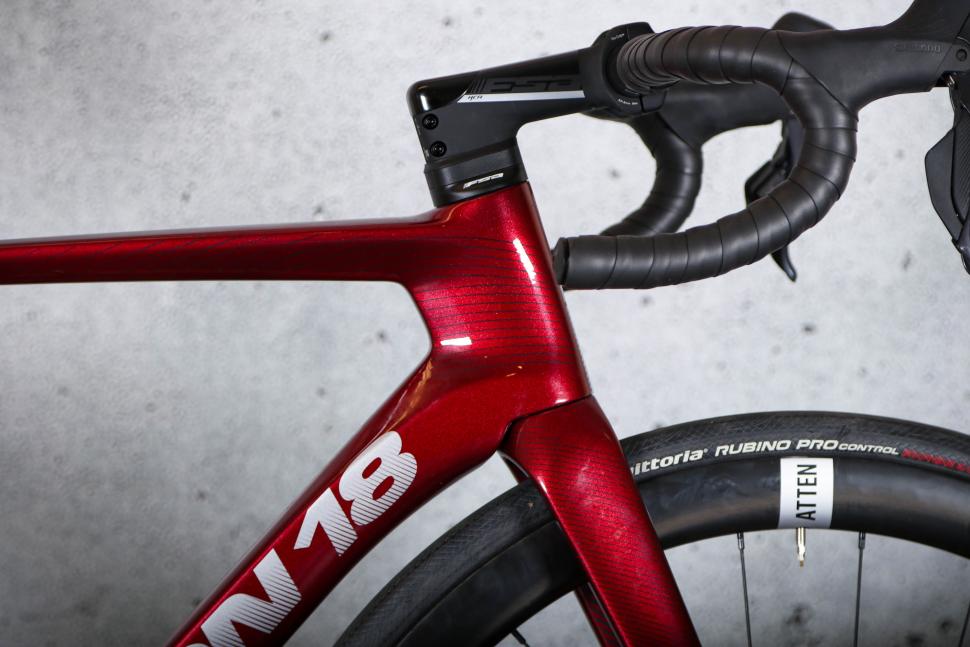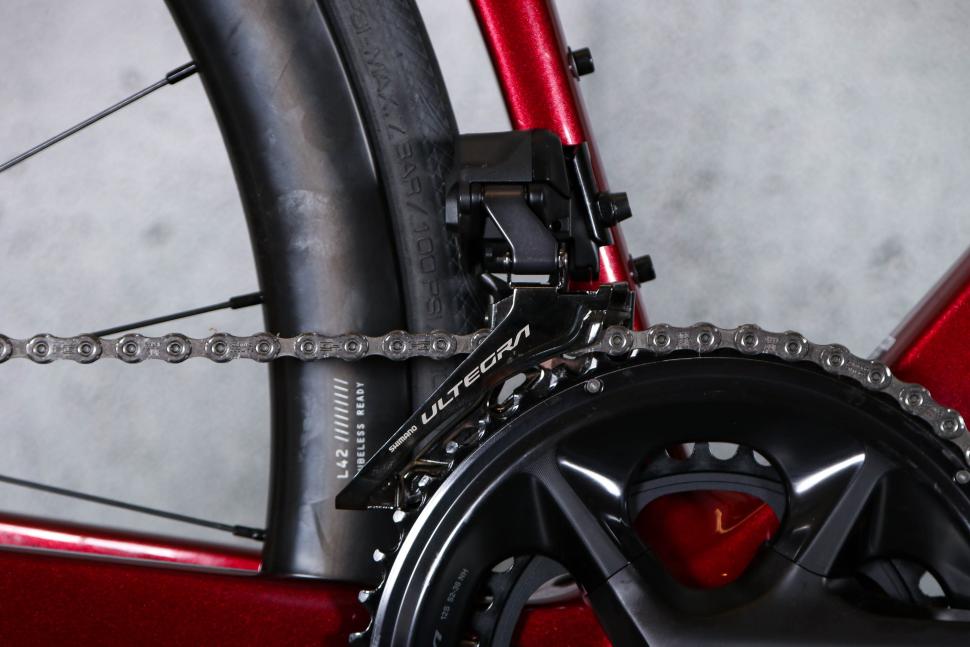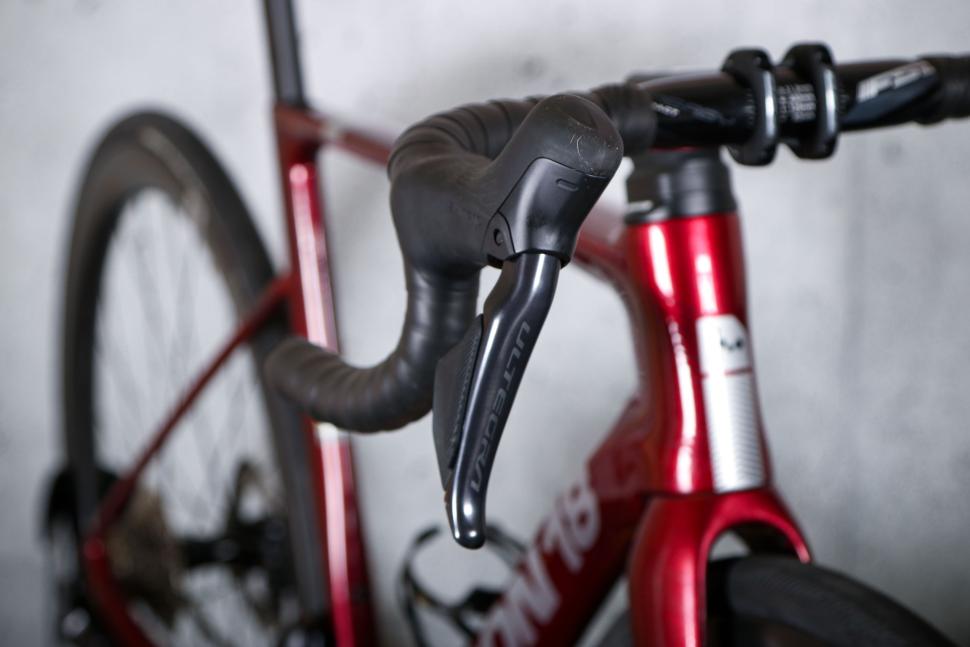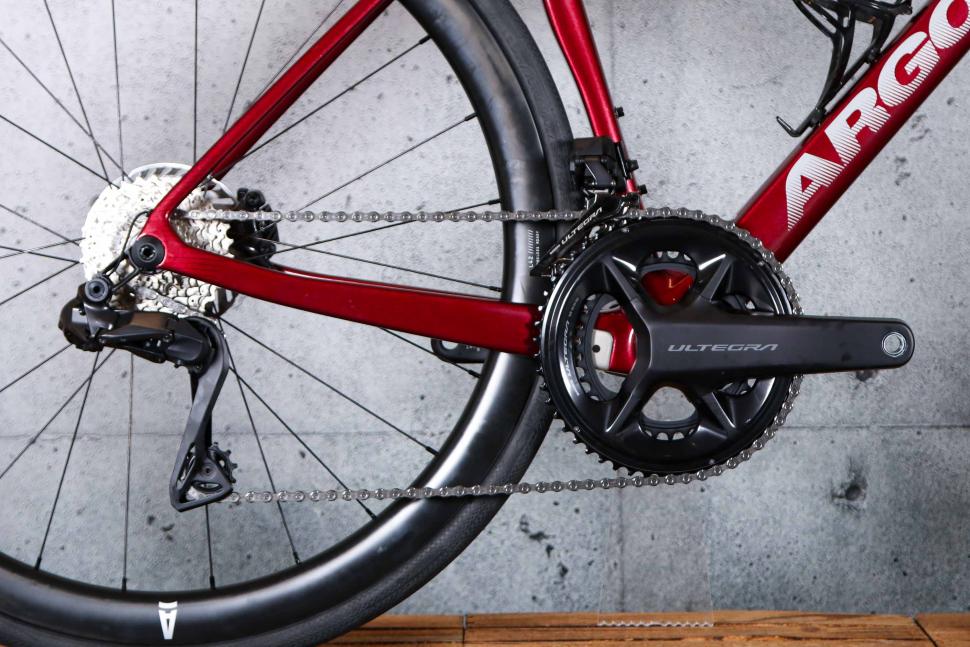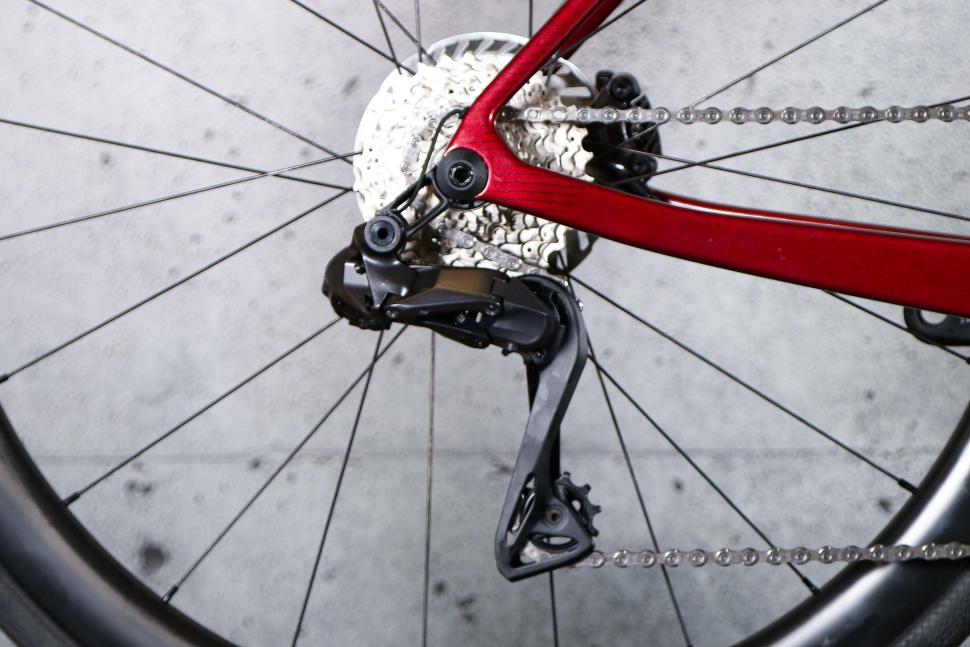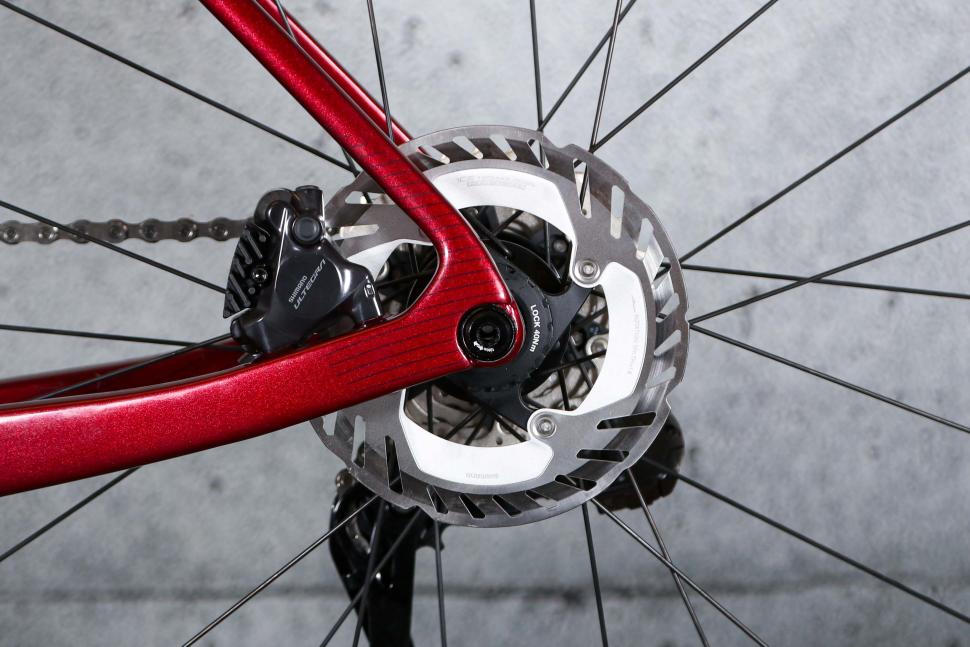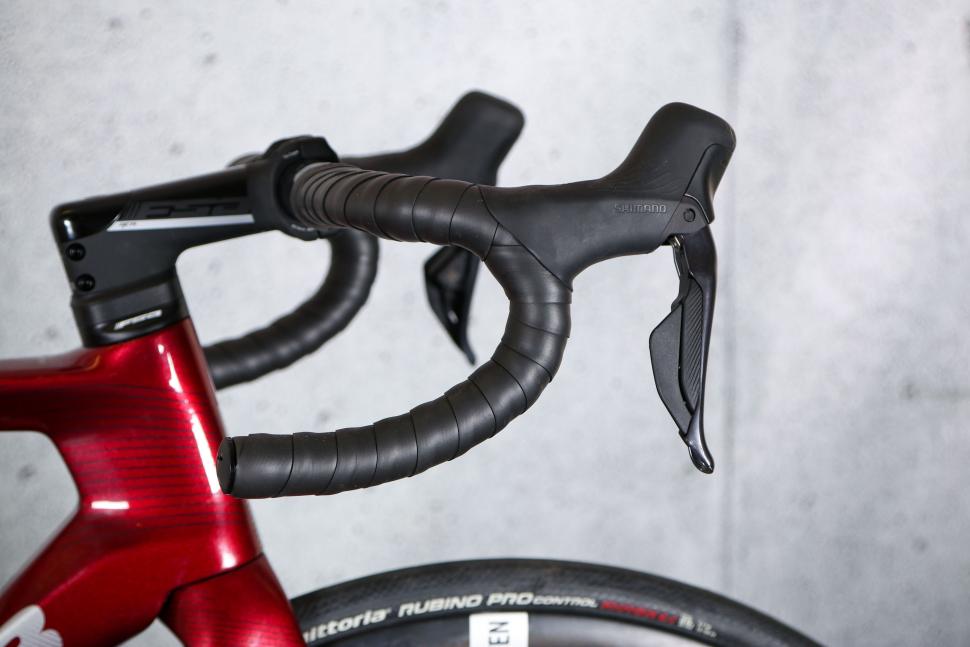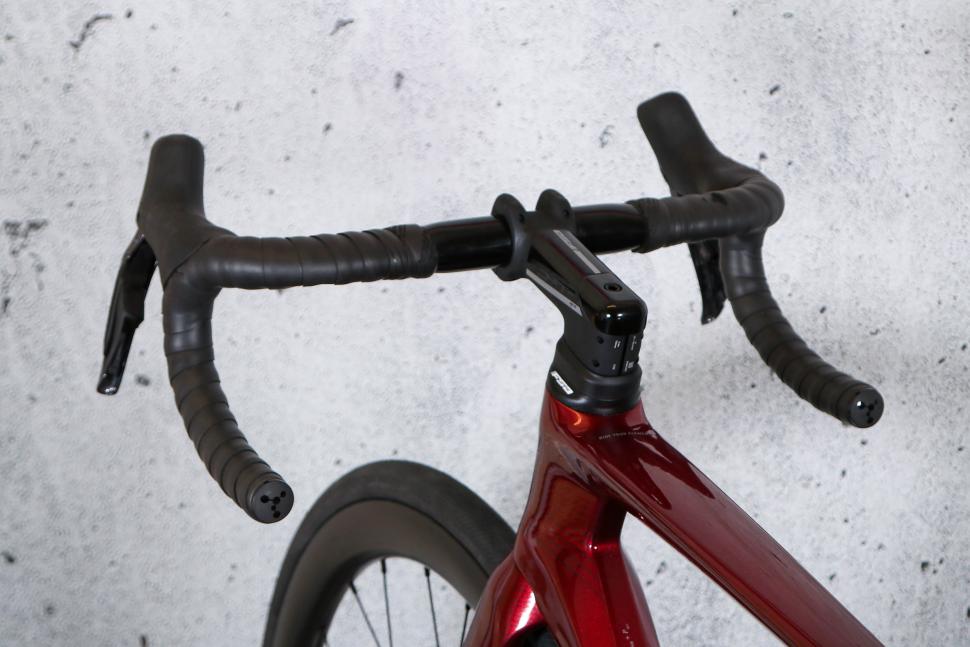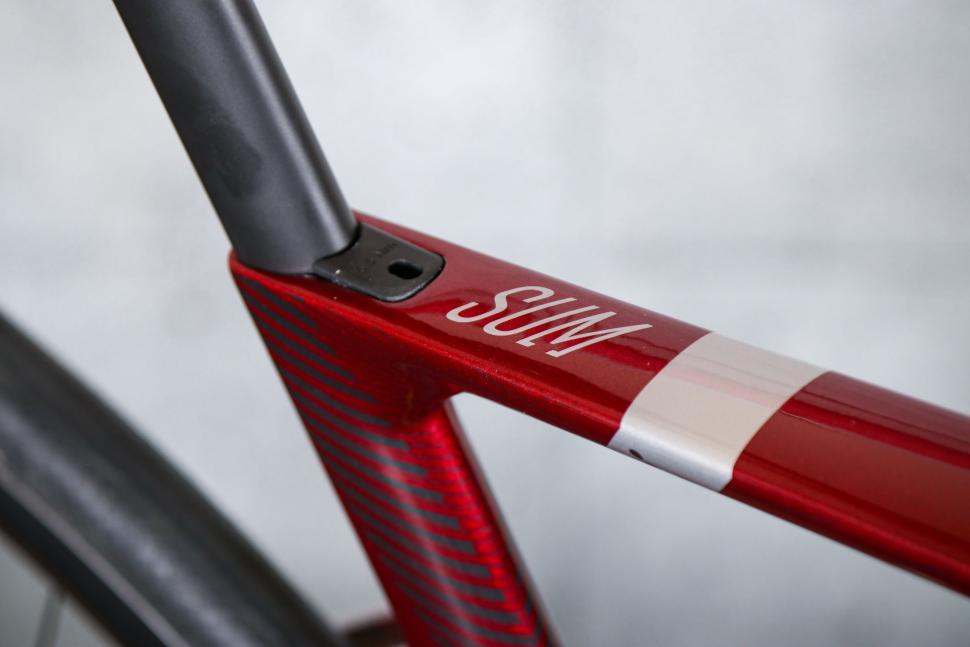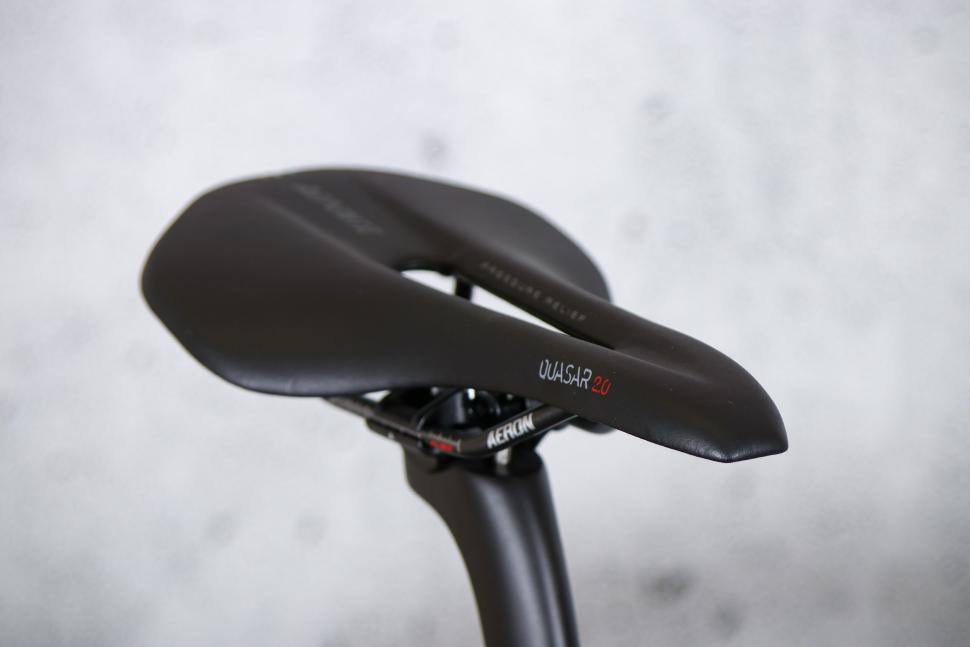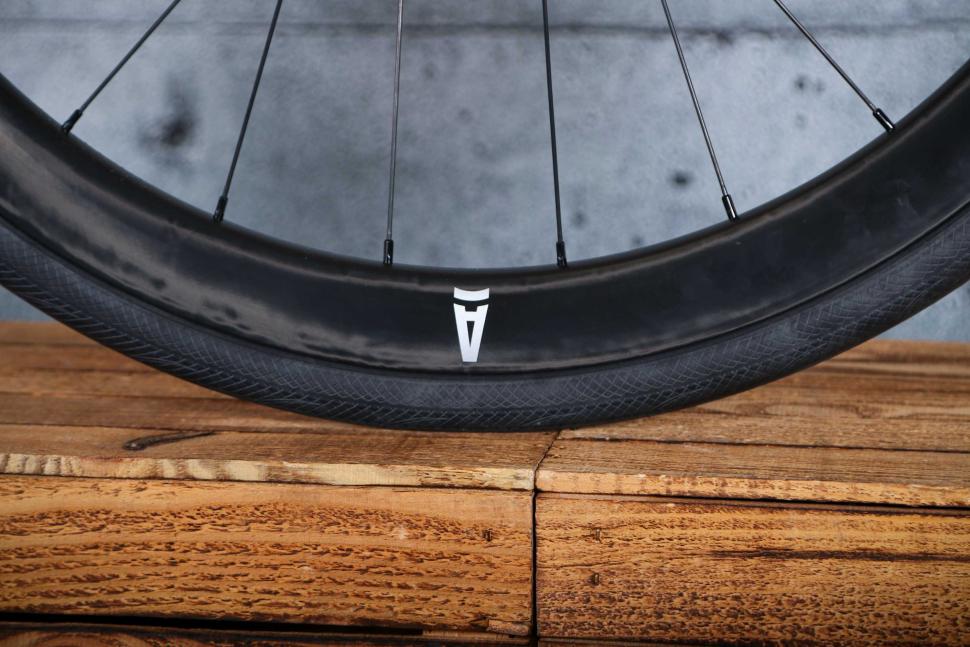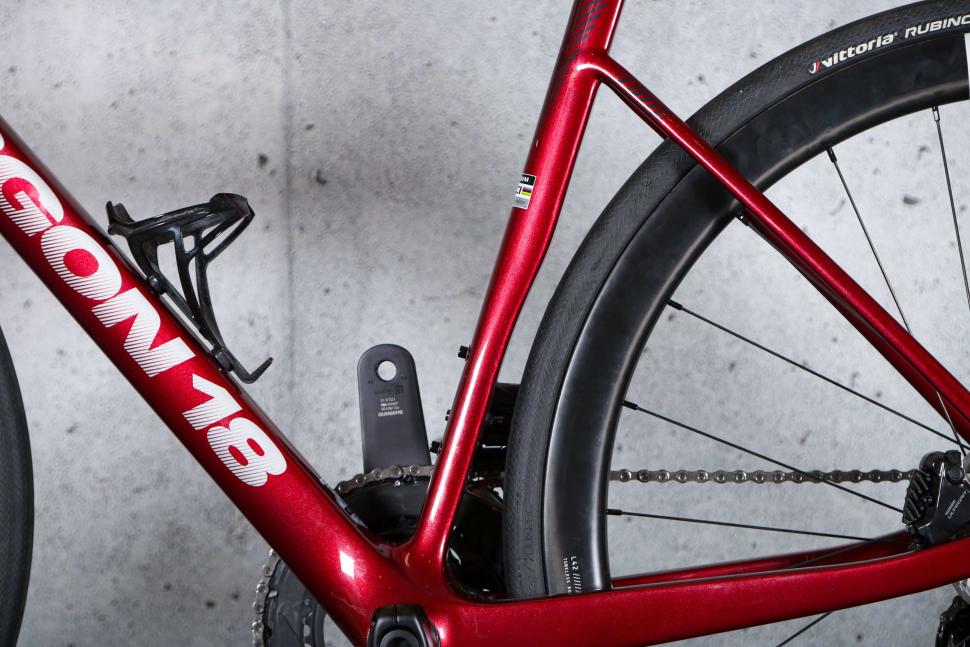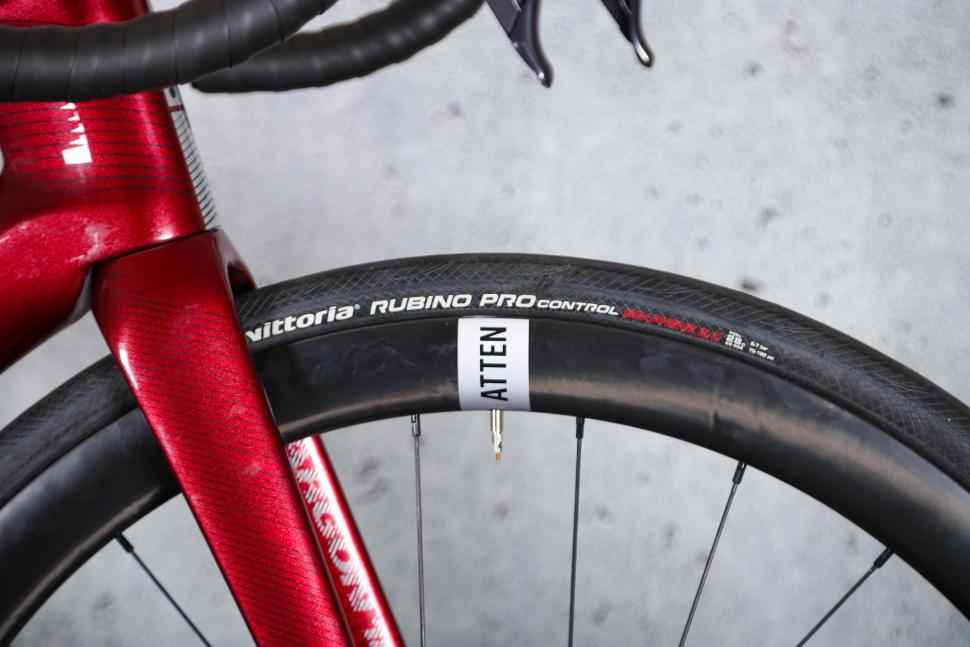The Argon 18 Sum is part of the company’s road race line-up, and it’s a very impressive bike overall. Stiff, agile and reasonably light, it is everything a race bike at this price level should be, with a big added dose of comfort. It’s one incredibly smooth and refined frameset that manages to deliver on the performance front without battering you about, even on UK roads.
> Buy now: Argon 18 Sum Shimano Ultegra Di2 – Atten for £5,500 from Argon 18
Check out our guides to the best aero road bikes and best road bikes for our top choices.
Argon 18 Sum: Ride
The Sum has an excellent ride quality, especially considering its large tube profiles and the fact that it’s designed to resist high loads from pedalling, steering and braking. It is very stiff throughout but it’s not buzzy or harsh anywhere, even in the stiffer sections of the frame – everything is very smooth and refined. On some cheaper frames you can feel the difference between areas that are focused on stiffness and areas designed for comfort – the Sum has the same ride quality throughout.
It feels rock solid when you are riding it hard and fast, but has a certain suppleness there at the contact points. This stops the Sum feeling skittish and out of control on rough surfaces, and allows you to take steep technical descents flat out without the bike feeling out of control. It’s a clever balance to pull off.
The short wheelbase of 990mm keeps the Sum feeling nimble, too, so when you combine that with the quick and precise steering, it feels surefooted regardless of what you are asking it to do.
It’s really responsive, too. At just over 7.5kg it’s not in the superlight category, but it’s still light enough to be rewarding when you’re climbing or going for a sprint.
For a semi-aero bike, it is definitely a good all-rounder.
I recently rode Argon 18’s Krypton Pro, which is part of its all-road line-up, and was hugely impressed with its ride quality, especially for such a stiff bike. With the Sum being more race orientated, I wasn’t expecting the same levels of comfort as the Krypton Pro, but boy is it close.
For those sections on the ride between the descents or the climbs, I found I could just tap out the power and keep spinning along with minimal fatigue. There is still vibration from the road, but it is muted enough that it doesn’t tire out any of your contact points. If you like to ride centuries or partake in sportives but still want to go fast, this is the kind of bike you are going to want.
Argon 18 Sum: Frame & fork
The Sum is one of those bikes that blends a bit of aero without going too extreme and adding weight to the overall build. It includes touches such as integrating the fork into the frame, dropped seatstays, an internal seatpost clamp and a recessed seat tube around the rear wheel.
It’s definitely a sleek-looking machine and the frame and fork are well made too. A quick look inside the seat tube shows a very smooth and clean finish to the parts of the frame you wouldn’t normally see.
The paint also looks to be finished well, as it’s blemish-free when looked at in the sunshine. If you don’t fancy the Race Day Red Gloss then there is also a Podium Grey Gloss on offer too.
Like most brands, Argon 18 has its frames manufactured in Asia, but it says it’s heavily involved in the process to make sure the carbon fibre layup from early prototypes and the design stage are met.
I’ve ridden hundreds of carbon fibre frames over the last 15 or so years and I can tell this is one that has been designed to offer very precise levels of stiffness and comfort throughout, something you don’t get from an off-the-shelf, out-of-a-catalogue frame.
In terms of tyre clearance Argon 18 says that 32mm are the largest you can fit, which is plenty for a race bike, in my view.
Argon 18 has specced a press-fit bottom bracket and you get a neat addition of an aluminium section to protect the carbon fibre frame from a drop of the chain.
The Sum uses Argon 18’s road race geometry so things are reasonably aggressive and aero position focused without being too extreme.
We have the medium frame here, which is one of six sizes available. The top tube length is 557mm while the seat tube is 505mm.
The head tube is 126mm without spacers, but Argon 18 gives you lengths including spacers and how that affects things in terms of stack and reach. With 15mm of spacers you have an equivalent head tube length of 141mm, with stack and reach figures of 554mm and 393mm respectively. With 25mm you are looking at 564mm of stack and 390mm of reach which is fairly typical.
The head angle is 72.7 degrees and the seat angle 73.5.
Argon 18 Sum: Componentry
Kicking things off with the groupset, Argon 18 has specced brilliant Shimano Ultegra Di2 components.
This is pretty much all the groupset anyone apart from a pro-level racer is going to need. It has very quick, precise shifting regardless of the conditions, and braking power and control that’s up there with the best on the market.
If you want the full lowdown on just how good it is then check out our in-depth review.
With the Sum being a race model, Argon 18 has specced a semi-compact 53/36-tooth chainset with an 11-30T cassette spread across the 12 sprockets. That’s a good range of gears for most riders looking for this style of bike – who don’t live in too hilly an area.
Braking-wise, the Sum uses a 160mm rotor on the front and a 140mm on the rear, which I think is ample for road use, especially on a race bike. Some brands spec 160mm on the rear too, but I’m not sure you need it.
For this kind of money you might expect a carbon fibre cockpit, but you won’t find that here on the Sum. The kit Argon 18 has specced is still rather nice, though, and certainly in keeping with the aesthetics.
For the handlebar you get an FSA Energy SCR Compact. It’s a double-butted and tapered 7050 grade of aluminium alloy construction, with a wide section of round bar either side of the stem clamping area to allow you to fit mounts for computers and lights, before it becomes a flattened ergonomic shape for the tops. This makes it comfortable for resting your hands on when climbing and so on, and the shallow drop means you don’t have to be massively flexible to get into an aero position.
The stem is an FSA ACR, the ACR standing for aerodynamic cable routing, as any cables or hoses can be directly fed from the stem into the top of the head tube so you don’t see them at all. It’s a good-looking piece of kit and certainly stiff enough for some spirited riding.
The seatpost is carbon fibre and specific to the Sum’s frame, and while an upgrade isn’t possible, you won’t need to anyway. I had no slippage issues with it at all, and could detect a small amount of flex for a bit of added comfort.
The Repente Quasar 2.0 saddle perched on top was a comfortable shape for me, and with minimal padding it felt nice and firm and gave good feedback from the road. At less than 170g it’s light, too.
Argon 18 Sum: Wheels & tyres
The Atten wheels are from Argon 18 itself, with the L42s sporting a 42mm-deep carbon fibre rim, optimised for 28-32mm wide tyres with a 21mm internal and 30mm external width.
Their depth and rounded profile give a good balance of aero performance and stability in crosswinds while still being light enough for climbing and sprinting. I found them a great set of wheels, with a good ride quality and no problems at all with regards to trueness or durability.
In the box with the bike you’ll find a pair of tubeless valves so you can set them up without inner tubes should you so wish.
Wrapped around the L42s are a pair of Vittoria Rubino Pro Control tyres, although the spec list says Vittoria Rubino TLR G2.0s. We reviewed those in 2020 and thought they were very good for long distance riders who are more concerned with longevity than overall top speed.
The same can be said for the Pro Controls: they’re tough, but not that generous when it comes to ride feel, speed or grip. They aren’t that supple either, so road feedback is muted to a degree. This is one component I’d change straight away. With something like a set of Continental’s GP5000s fitted, the Sum can be ridden to its true capabilities.
Argon 18 Sum: Value
When Matt reviewed the Sum back at the beginning of 2023 his only real criticism was the pricing, especially the fact that you could build the bike with the same parts for less than the RRP of the complete machine. That was the SRAM Rival version, which was priced at £5,399; the same model now costs £4,000.
For £5,500, this Ultegra Di2 model comes with those deep-section carbon rims as opposed to the alloy offerings from Hunt found on the Rival model.
This lower pricing has made the Sum much more competitive.
The Scott Addict RC 30 which I recently reviewed is a very similar bike to the Argon 18 in terms of its riding style and comfort. That Rival-equipped model was £4,399, with a set of alloy Syncros wheels.
The RC 10 model, which comes with SRAM Force AXS groupset – so a roughly equivalent comparison – and carbon wheels, is £6,399.
I reviewed Fara’s F/Road recently too, again a very similar style of bike to the Sum, and another that has managed to balance stiffness with comfort. The weight is near identical to the Sum and it, too, comes with an Ultegra Di2 groupset and a set of deep-section carbon wheels, Zipp 303s in this case, for its £5,873 price tag. It does come with a full-carbon fibre integrated cockpit, though, which adds a little more bling, although it does limit adjustment.
Argon 18 Sum: Conclusion
The Sum is a race-inspired bike that balances speed and comfort. A tough combination to pull off well, but Argon 18 has achieved it. It’s a really lovely bike to ride, not just because of the ride quality but also the way that the geometry works to create a precise-handling, nimble bike that is pretty easy to ride fast. To top everything off, the price is competitive against many other very good bikes.
> Buy now: Argon 18 Sum Shimano Ultegra Di2 – Atten for £5,500 from Argon 18
Verdict
Very comfortable race bike with sorted geometry and an impressive spec list – apart from the tyres
Make and model: Argon 18 Sum Shimano Ultegra Di2 – Atten
Size tested: Medium, 557mm
List the components used to build up the bike.
Wheels: ATTEN L42 wheelset
Tyres: Vittoria Rubino Pro TLR G2.0 700x28c
Bottom Bracket: Shimano SM-BB72
Front Derailleur: Shimano Ultegra Di2 R8150
Rear Derailleur: Shimano Ultegra Di2 R8150
Crankset: Shimano Ultegra R8170
Chain: Shimano Ultegra CN-M8100 12S
Cassette: Shimano Ultegra CS-R8100 11-30
Brakes: Shimano Ultegra R8150
Rotors: Shimano Ultegra RT-CL800 / F:160mm R:140mm
Shifters: Shimano Ultegra Di2 R8170
Handlebar: FSA Energy SCR Compact
Stem: FSA ACR ST-OS-160
Bar Tape: Ciclovation LEATHER TOUCH Tornado Gloss
Saddle: Repente Quasar
Seatpost: SUM specific
Tell us what the bike is for and who it’s aimed at. What do the manufacturers say about it? How does that compare to your own feelings about the bike?
Argon 18 says, “Own the season: the Sum will get you ahead on the climbs, keep you there on the flats, and power you through the sprints.”
I would describe it as a lightweight, stiff race bike with a great ride quality.
Where does this model sit in the range? Tell us briefly about the cheaper options and the more expensive options
There are two models in the line-up, this Shimano Ultegra Di2, the most expensive at £5,500, and a SRAM Rival AXS option for £4,000.
Overall rating for frame and fork
8/10
Tell us about the build quality and finish of the frame and fork?
Smooth and clean inside and out, and finished with a flawless paint job.
Tell us about the materials used in the frame and fork?
The frame and fork are carbon fibre, although it’s the Elite level layup as opposed to the Pro level found on Argon 18’s higher end frames.
Tell us about the geometry of the frame and fork?
The geometry is fairly typical of a road race bike of this size. It has a short wheelbase and relatively steep angles, a combination that gives a nimble and fast feeling overall.
How was the bike in terms of height and reach? How did it compare to other bikes of the same stated size?
The height and reach figures are fairly typical for this style of bike.
Was the bike comfortable to ride? Tell us how you felt about the ride quality.
Yes. The ride quality is very good for a stiff bike with racing intentions.
Did the bike feel stiff in the right places? Did any part of the bike feel too stiff or too flexible?
Stiffness throughout the bike is impressive.
How did the bike transfer power? Did it feel efficient?
Good transfer due to the stiffness of the frame and fork, and the weight helps too.
Was there any toe-clip overlap with the front wheel? If so was it a problem?
No.
How would you describe the steering? Was it lively neutral or unresponsive? Quick.
Tell us some more about the handling. How did the bike feel overall? Did it do particular things well or badly?
A fast and direct front end makes this a great bike to ride at speed. It’s not twitchy or a handful to ride, though.
Which components had the most effect (good or bad) on the bike’s comfort? would you recommend any changes?
I liked the saddle, but the tyres aren’t the most supple, which takes away from the overall comfort.
Which components had the most effect (good or bad) on the bike’s stiffness? would you recommend any changes?
The L42 wheels had good lateral stiffness and the FSA cockpit also showed no flex when riding hard out of the saddle.
Which components had the most effect (good or bad) on the bike’s efficiency? would you recommend any changes?
I’d change the tyres for something more supple and faster rolling.
Rate the bike for efficiency of power transfer:
8/10
Rate the bike for acceleration:
8/10
Rate the bike for sprinting:
8/10
Rate the bike for high speed stability:
9/10
Rate the bike for cruising speed stability:
8/10
Rate the bike for low speed stability:
7/10
Rate the bike for flat cornering:
8/10
Rate the bike for cornering on descents:
9/10
Rate the bike for climbing:
8/10
Rate the drivetrain for performance:
9/10
Rate the drivetrain for durability:
8/10
Rate the drivetrain for weight:
8/10
Tell us some more about the drivetrain. Anything you particularly did or didn’t like? Any components which didn’t work well together?
Ultegra is a great groupset in terms of performance, and the gear ratios chosen here reflect the racy nature of the Sum.
Rate the wheels for performance:
8/10
Rate the wheels for durability:
8/10
Rate the wheels for weight:
8/10
Rate the wheels for comfort:
8/10
Tell us some more about the wheels.Did they work well in the conditions you encountered? Would you change the wheels? If so what for?
A good quality set of wheels with dimensions that suit all kinds of riding styles.
Rate the tyres for performance:
7/10
Rate the tyres for durability:
8/10
Rate the tyres for weight:
7/10
Rate the tyres for comfort:
6/10
Tell us some more about the tyres. Did they work well in the conditions you encountered? Would you change the tyres? If so what for?
Durable and reliable rubber but not the quickest rolling or most supple.
Rate the controls for performance:
8/10
Rate the controls for durability:
8/10
Rate the controls for weight:
8/10
Rate the controls for comfort:
8/10
Tell us some more about the controls. Any particularly good or bad components? How would the controls work for larger or smaller riders?
Well-specced kit throughout. I like the look of the FSA components and they perform well too.
Did you enjoy riding the bike? Yes
Would you consider buying the bike? Yes
Would you recommend the bike to a friend? Yes
How does the price compare to that of similar bikes in the market, including ones recently tested on road.cc?
I think the Sum is well priced against the competition – the equivalent Scott RC 10 is £6,399, and Fara’s F/Road is £5,873, though that does come with a full-carbon integrated cockpit.
Rate the bike overall for performance:
8/10
Rate the bike overall for value:
6/10
Use this box to explain your overall score
It’s very good: competitively priced, well built, well specced and with a great ride quality.
Age: 44
I usually ride: This month’s test bike My best bike is: B’Twin Ultra CF draped in the latest bling test components
I’ve been riding for: Over 20 years I ride: Every day I would class myself as: Expert
I regularly do the following types of riding: time trialling, commuting, club rides, sportives, fixed/singlespeed,

